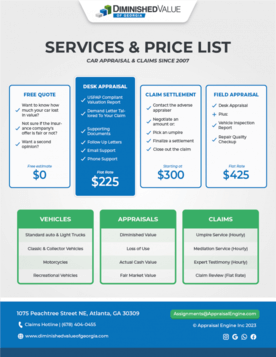
If the insurance company is offering you an unfair loss in value amount, you need to hire an independent appraiser to rebut their valuation.
You can also escalate the claim by contacting the Montana Insurance Commissioner.
To get the process started and to get a free estimate, please fill out the form below.
Insurance Bad Faith in Montana
Citation: Mont.Code.Ann. §33-18-201 and Mont.Code.Ann.§33-18-242(3)
33-18-201. Unfair claim settlement practices prohibited. A person may not, with such frequency as to indicate a general business practice, do any of the following:
(1) misrepresent pertinent facts or insurance policy provisions relating to coverages at issue;
(2) fail to acknowledge and act reasonably promptly upon communications with respect to claims arising under insurance policies;
(3) fail to adopt and implement reasonable standards for the prompt investigation of claims arising under insurance policies;
(4) refuse to pay claims without conducting a reasonable investigation based upon all available information;
(5) fail to affirm or deny coverage of claims within a reasonable time after proof of loss statements have been completed;
(6) neglect to attempt in good faith to effectuate prompt, fair, and equitable settlements of claims in which liability has become reasonably clear;
(7) compel insureds to institute litigation to recover amounts due under an insurance policy by offering substantially less than the amounts ultimately recovered in actions brought by the insureds;
(8) attempt to settle a claim for less than the amount to which a reasonable person would have believed the person was was entitled by reference to written or printed advertising material accompanying or made part of an application;
(9) attempt to settle claims on the basis of an application that was altered without notice to or knowledge or consent of the insured;
(10) make claims payments to insureds or beneficiaries not accompanied by statements setting forth the coverage under which the payments are being made;
(11) make known to insureds or claimants a policy of appealing from arbitration awards in favor of insureds or claimants for the purpose of compelling them to accept settlements or compromises less than the amount awarded in arbitration;
(12) delay the investigation or payment of claims by requiring an insured, claimant, or physician of either to submit a preliminary claim report and then requiring the subsequent submission of formal proof of loss forms, both of which submissions contain substantially the same information;
(13) fail to promptly settle claims, if liability has become reasonably clear, under one portion of the insurance policy coverage in order to influence settlements under other portions of the insurance policy coverage; or
(14) fail to promptly provide a reasonable explanation of the basis in the insurance policy in relation to the facts or applicable law for denial of a claim or for the offer of a compromise settlement.
Section 33-18-232: TIME FOR PAYMENT OF CLAIMS
(1) An insurer shall pay or deny a claim within 30 days after receipt of a proof of loss unless the insurer makes a reasonable request for additional information or documents in order to evaluate the claim. If an insurer makes a reasonable request for additional information or documents, the insurer shall pay or deny the claim within 60 days of receiving the proof of loss unless the insurer has notified the insured, the insured’s assignee, or the claimant of the reasons for failure to pay the claim in full or unless the insurer has a reasonable belief that insurance fraud has been committed and the insurer has reported the possible insurance fraud to the commissioner. This section does not eliminate an insurer’s right to conduct a thorough investigation of all the facts necessary to determine payment of a claim.
(2) If an insurer fails to comply with this section and the insurer is liable for payment of the claim, the insurer shall pay an amount equal to the amount of the claim due plus 10% annual interest calculated from the date on which the claim was due. For purposes of calculating the amount of interest, a claim is considered due 30 days after the insurer’s receipt of the proof of loss or 60 days after receipt of the proof of loss if the insurer made a reasonable request for information or documents. Interest payments must be made to the person who receives the claims payment. Interest is payable under this subsection only if the amount of interest due on a claim exceeds $5.
(3) A private cause of action under 33-18-201 or 33-18-242 may not be based on the compliance or noncompliance with the requirements of this section and evidence of compliance or noncompliance with this section is not admissible in any private action based on 33-18-201 or 33-18-242.
Loss in Value Questionnaire (Will take 2 minutes of your time)
Please fill out the form below to receive a FREE Diminished Value estimate.






